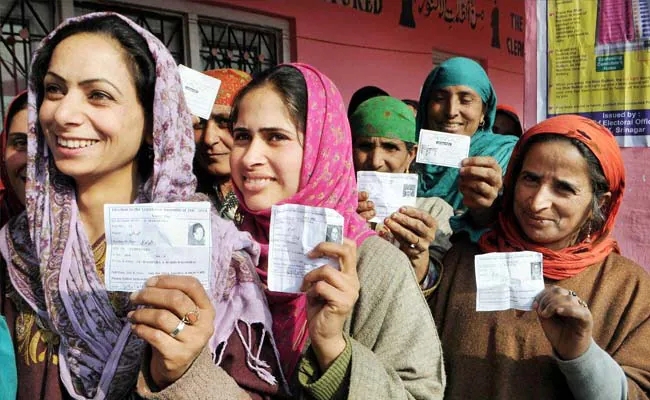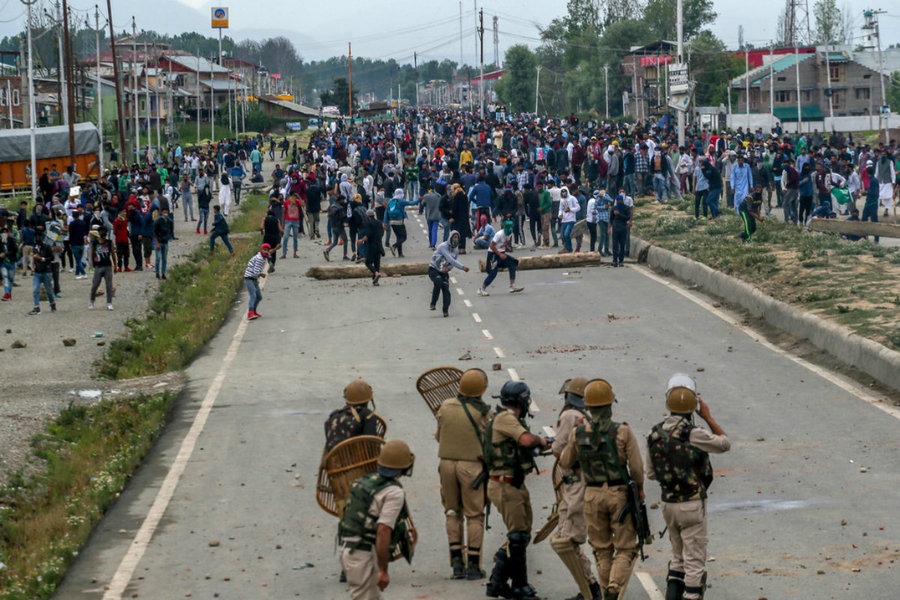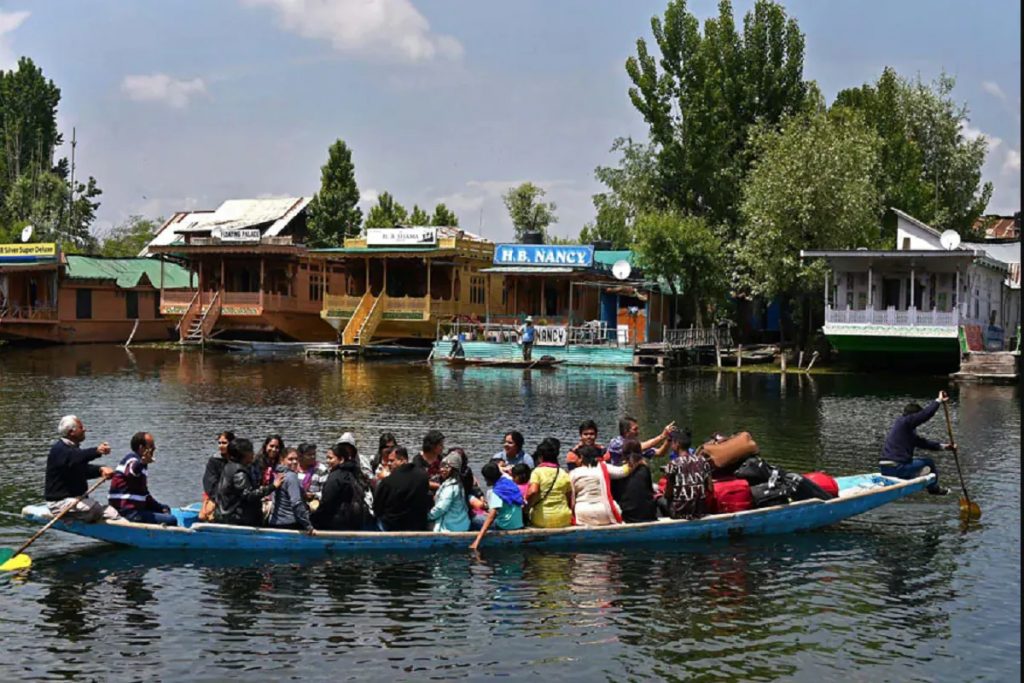
- After the removal of Article 370 ‘Dilli ki Doori’ as well as ‘Dil Ki Doori’ have been successfully bridged with massive support of Kashmiris for Constitutional integration of India.
- Insurgency had ruined the normal functioning of the state, and had forced New Delhi to notify the erstwhile state of J&K as a “disturbed area” and invoke the AFSPA
- Statistics further show that there has been a 40% decrease of involvement of local youth in terrorist organizations as only 67 youths of Kashmir valley were brainwashed and made to pick up guns against India.
- After the abrogation of Article 370 due to PM Modi’s iron grip policy of zero tolerance towards terrorism and strengthening of security apparatus, have effectively checked terrorism in the state.
- Political leaders who used to enjoy the benefits of Article 370 are fighting for survival as all that the people want is accountability, rule of law and participation instead of separatism and segregation.
(This is the second article in the series in the run-up to the 2nd anniversary of the abrogation of Article 370. First article can be read here -> Abolition of Article370 – Secular or Communal?)
It was on Aug 5 2019 Home Minister Amit Shah in Rajya Sabha had said “Article 370 was the root of terror in Jammu and Kashmir. It is time for it to go… if it doesn’t go today, we can’t remove terrorism from Jammu and Kashmir.” After the removal of Article 370 ‘Dilli ki Doori’ (the distance from Delhi) as well as ‘Dil Ki Doori’ (the distance from the heart) have been successfully bridged with massive support of Kashmiris for Constitutional integration of India. ‘Terror was Yesterday, Development is today and Kashmir’s future is India’s future’ has become the thought of every Kashmiri. Fundamentalism, separatism and terrorism is being replaced participation, government support, education, skill development, entrepreneurship with the future in the minds of Kashmiris.
The People of Kashmir want development, peace, job and integration with the rest of India. In the recently held District Development Council Elections people participated enmass for a change. Even the leaders of Jammu Kashmir 4 Former Chief Ministers and few Leaders from all the parties are demanding elections and statehood. There was a time when voting, campaigns and elections were boycotted. Now people are asking for elections, accountability, debate and discussion, and audits for the money granted by the center to the state.
Insurgency had ruined the normal functioning of the state, and had forced New Delhi to notify the erstwhile state of Jammu and Kashmir (J&K) as a “disturbed area” and invoke the Armed Forces Special Powers Act (AFSPA) to maintain peace.
From Security Perspective, there has been a fundamental transformation in Jammu Kashmir after August 5, 2019, the day when PM Modi’s government abrogated Article 370 of the constitution. After independence, insurgency was born as an indigenous movement against the corrupt governance and autocratic rule of Sheikh Abdullah. Till about 1989, various insurgent movements took place in the state. Then came the proxy war of Pakistan by supporting cross border terrorism. Kashmir youth were funded, trained and given arms and weapons to fight India. Insurgency had ruined the normal functioning of the state, and had forced New Delhi to notify the erstwhile state of Jammu and Kashmir (J&K) as a “disturbed area” and invoke the Armed Forces Special Powers Act (AFSPA) to maintain peace. Though New Delhi tried to occasionally reach out to Pakistan and even to Kashmiris over the years, except for brief periods of hope, peace had not prevailed in the Kashmir Valley.
Kashmir before Abrogation of Article 370

Before the abrogation of the Article, the data showed from 1990 to 2001 there were 1983 Terror incidents. 32,293 AK Rifles and Pistols, 985 UMG’S, and 706 Rocket Launchers were recovered. There was also an increase in the terror incidents in Jammu and Kashmir between 2014 and 2018. In 2014, 222 terror incidents were reported with 47 security personnel killed and 28 civilians lost their lives. The next year, in 2015, the region reported 208 terror incidents along with the death of 39 security personnel and 17 civilians. The number of terror incidents jumped to 322 in 2016 and 342 in 2017. While 82 security personnel were martyred in 2016, 80 casualties were reported in 2017. On the other hand, 15 civilians were killed in 2016, which increased to 40 in 2017, highest for the 2014-20 period.
In May 2003 in Parliament Former PM A B Vajpayee had said “You can change friends but not neighbors.” With this Mantra, he tried to reconcile with Pakistan with an open mind. He appealed Pakistan to stop cross border terror, and not aid, abate terror groups against India. But the open appeal of Former PM Vajpayee went in vain as his ‘Bus Diplomacy’ ended with Kargil intrusion.
Then when PM Narendra Modi became the PM he gave one more chance for Pakistan to mend its ways. He had invited Nawaz Sharif, then Prime Minister of Pakistan, for his swearing-in ceremony, and made an unscheduled landing in Lahore to greet his counterpart on his birthday. But the Army ISI and the Pakistan Government did not mend their ways as in 2016 we saw a terror attack on the Pathankot Air Force Station, the targeting of Indian army in the Uri sector on 9 September 2016 in which 17 army personnel were killed and 20 others were injured. In response, India retaliated by conducting surgical strikes on terror launchpads in Pakistan-occupied Kashmir (PoK).
Peace gestures with Pakistan were a waste of time and energy as India did not get a favorable response from Pakistan. In 2015, former President of Pakistan Pervez Musharraf admitted that Pakistan had supported and trained insurgent groups in the 1990s which is still continuing.
Peace gestures with Pakistan were a waste of time and energy as India did not get a favorable response from Pakistan. In 2015, former President of Pakistan Pervez Musharraf admitted that Pakistan had supported and trained insurgent groups in the 1990s which is still continuing. Partial surgical strikes and war were the answers to this never ending issue. PM Narendra Modi, Home Minister Amit Shah, Defence Minister Rajnath Singh, National Security Adviser Ajit Doval and team brainstormed over ways to ensure peace in Kashmir moving forward. They also analysed as to why some people, especially the young generation, and intellectuals in Kashmir feel alienated.
A thorough study with Kashmir experts was done and they came to the conclusion that to integrate every Kashmiri with India from their soul to heart, abrogation of Article 370 and Article 35A were necessary. Most of the central funds were not reaching and the common people to the last man were fed up with corruption while few family political oligarchs blackmailed and strained the State. Hence the state of J&K was bifurcated into two union territories to pave the way for better administration, good governance, economic development of the region and for peace.
Kashmir After Abrogation of Article 370

According to Union Minister of State for Home G Kishan Reddy “after the abrogation of Article 370, the number of terrorist incidents in Jammu and Kashmir has reduced significantly.” A total of 614 terror incidents were reported in Jammu and Kashmir in 2018 that came down to 594 in 2019, a three percent reduction. The number further dropped to 244 in 2020. Till February 2021, 15 terror incidents occurred in the Union Territory in which eight terrorists were killed. 33 security personnel and six civilians were killed in Jammu and Kashmir in 2020 and 27 security personnel and five civilians were killed in 2019.
The number of terrorists killed in the region was 257 in 2018; 157 in 2019; 221 in 2020 and by March 2021 IGP Kashmir Vijay Kumar informed that 19 terrorists have been eliminated. There’s been no civilian deaths.” 51 grenade attacks took place in Kashmir from January 1 till July 15, 2019, while in 2020 the number has reduced to just 21. The number of IED attacks has also reduced significantly as only one IED attack took place in Kashmir from January 1 till July 15, 2020. The number of IED attacks during the same period in 2019 was six.
Statistics further show that there has been a 40% decrease of involvement of local youth in terrorist organizations as only 67 youths of Kashmir valley were brainwashed and made to pick up guns against India.
51 grenade attacks took place in Kashmir from January 1 till July 15, 2019, while in 2020 the number has reduced to just 21. The number of IED attacks has also reduced significantly. Statistics further show that there has been a 40% decrease of involvement of local youth in terrorist organizations.
After the abrogation of Article 370 due to PM Modi’s iron grip policy of zero tolerance towards terrorism and strengthening of security apparatus, strict enforcement of law against anti-national elements, intensified cordon and search operations, security forces close watch on persons who attempt to provide support to terrorists and initiate action against them, have effectively checked terrorism in the state. The strategy of contain, control and stopping communication with Pakistan, surgical strikes, bleeding of cross border supporters training grounds has terror take a backstage in Kashmir.
Political leaders who used to enjoy the benefits of Article 370 are fighting for survival as all that the people want is accountability, rule of law and participation instead of separatism and segregation. Now Kashmiris are integrating with India constitutionally as any other Indians and they have become equals. It is hoped that Srinagar, which was founded by emperor Ashoka, Anantnag (Anant-nāg means “numerous springs”) and Baramulla (two Sanskrit words Varaha (Boar) and Mula) will regain their true glory in the coming days.
(The opinion expressed are author’s own and do not necessarily reflect the views of SamvadaWorld)
M.AM.PhiL/(PhD SNU South Korea)
